The Wisdom of the East Man and His Becoming. By
Rene Guenon. Translated by Charles Whitby. (Rider. 10s. 6d.) TriosE of us who are interested in the political aspirations' of India and Egypt and of that vast revulsion against Western ways of thought of which there are eyidences in every Eastern country, would do well to consider the ideals and philosophies from which the present " revolt of the East " springs, and from which, be it said in parenthesis, our own religion may derive.
Mr. Mason deals in his brief but brilliant The Creative East with India, China, and Japan—three very different cultures which are developing in three very different ways. Man, we are told, expresses himself in terms of spirituality, aestheticism, and utilitarianism and we are startled, but pleased, to find that. the book is dedicated to a well-known London editor, " in whom the three factors of self-fulfilment unite." Would that .Mr. Blumenfeld had found it possible (I must observe in passing) to promulgate more of the true philosophy of India through the newspapers which he- directs. Yet the difficulties of recOnciling -the , two civilizations of East and West are many, one must admit, for we have grown very far, mentally as well as physically, from, those Aryan brethren of ours who sit contemplating the sacred rivers of India. Yet the shape of our heads is the same. Curious it is that the cells inside them should have organized themselves for such different ends.
Only during the present generation, as Mr. Mason points out, has the power of the Unconscious been acknowledged in the West. In the East it has been studied for thousands of years. With us, Freud has nursed this psychological baby into life and explained to us how it possesses sources of information unknown to self-consciousness. The Brahminq had discovered this long before the Christian era ; but they weren't busy fighting, inventing, conducting Inquisitions, inventing steam engines, motors, telephones. Instead, they looked inside themselves. " India's spiritual subconscious knowledge can now serve as confirming evidence for Western science unable any longer to cling to the hypothesis of the indestructibility of matter for support of a materialist philosophy of life." We must not, however, consider that the East is purely passive in its mysticism and that our thinkers are the active, practical searchers. The converse is probably true. We in the West (as a balance, perhaps, to our very serious concern with what the East considers the world of illusion) tend to fall into lethargy and obscurantism and pedantry when things of the mind are considered. A yogi will train for his initiation with all the definiteness of an athlete preparing for a boat race. For him, the world is an apple whose flavour he is to enjoy, and he seeks to set his teeth in it. The Western student, on the contrary, will measure and describe the apple and devote himself to calculations of inordinate length and complexity concerning it. In the end he does not taste of it.
Such a comparison between the methods of East and West may be safely applied to M. Guenon's learned treatise on the Vedanta. The author is master of his subject so far as its technical aspect goes, but the Aryan scriptures, of which the Vedas are the spring and the Upanishads the noble river, or the main current of the Indian soul's movement to Reality, are not books at all in the Western sense of manuals designed to give the reader full and complete information on their subject. The object of these writings is to give the casual reader the minimum knowledge of the doctrine they preserve, for knowledge is a keen tool and the elders of our race would not cast pearls before swine. The books are merely memoria technica, keys in the hands of the gurus, whereby they (and they only) can unlock the secrets of their tradition to those whom they consider fit for enlightenment. Without practical and oral interpretation, they are mere will o' the wisps to bog learned fools. For untold centuries Aryan doctrine has been handed down from sage to disciple : that continuity is not broken yet, and I do not think any Western commen- tary such as Man and His Becoming can add to our knowledge of what the forefathers of our race really thought or what an Indian Vedantist thinks to-day about the ultimate problems of life.
Never was a hook more in need of reviewing, however, for it contains matter of serious importance, mingled with what I believe to be a complete misunderstanding of the real life of the Spirit as it has been and is still being lived by a small but select number of Indians to-day. Yet a discussion of the matter would pass if not over the reader's head, at any rate beyond the range of his interest. In fairness to M. Guenon, however, I must say that his exposition of the Veda as a Vision or a Way of Life and not a philosophy or religion is very just and able, and ,that his treatment of this point alone would entitle his volume to fuller and more sympathetic con- sideration than it can be given here. But, alas the book is almost unreadable to anyone who is not versed in Sanskrit terms. Moreover, the chapters on the Coronal Artery and the Solar Ray and on the Path to Liberation seem to me just as ridiculous and fanciful as would an account of a cricket match written by a guru who had never left a Himalayan hill-top. M. Guenon, in short, has approached his subject purely from the intellectual side.
Dr. Rele, whose Mysterious Kundalini has already been mentioned in these columns, combines the medical knowledge of the West with congenital aptitude for the mysticism of the " As-if." He adopts a decidedly original view of the Gita. To him it is a treatise on psycho-analysis, or rather, perhaps, of psycho-synthesis, for unlike Freud (basing his treatment of the disordered mind on dark primaeval desires of the Ego), the Hindu method directs the consciousness to the divine qualities of the Psyche, as some of Freud's disciples are now doing. Arjuna the Charioteer of the Song Celestial is cross-examined by Krishna, the divine psycho-analyst, and is shown how to curb and control the splendid steeds of desire and how the whip of the will on their flanks will make them pull together as a team. It is impossible within my space to pursue the argument here. I can commend it, however, to all who are interested in psychology and are prepared to make the effort necessary to acquire the " Eastern angle." Such inquirers will find their labour well repaid.
F. Y.B.













































 Previous page
Previous page